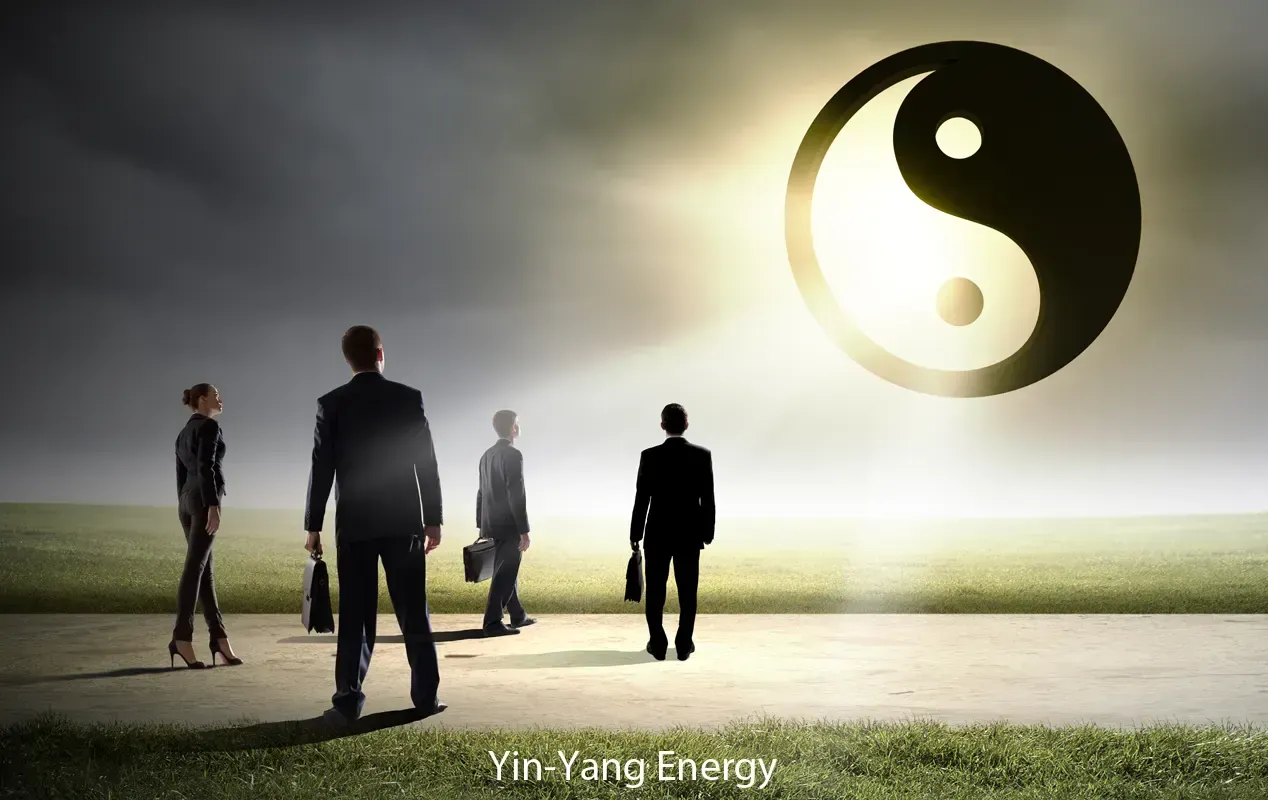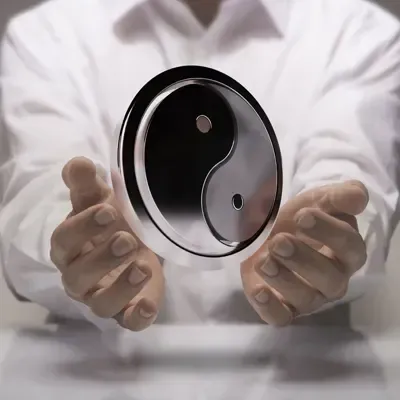Jordan Canon
Spiritual Advisor
Yin Yang Energy - Jordan Canon Spiritual Advisor

Understand How To Balance Ying Yang Energy to Evolve Your Soul and Create the Future You Wish To Experience
As a car karaoker (is that a word?), I'm sure you can imagine hearing a song for the first time that you instantly love. You might download the lyrics or just play the song over and over again so you learn how to sing the song.
Maybe it takes you a few hundred times to learn it, or maybe it takes a few thousand, but no matter how long it takes you to learn, the end result is that you'll always remember the words. To this day, I can sing Ice, Ice, Baby by Vanilla Ice, with or without music.
Learning and developing spiritual skills requires the same effort. In fact, since
humans don't have instincts, everything we know and can do is learned. I hope you read the rest of the pages on this website from that viewpoint.
What is Yin Yang Energy?
Yin Yang represents two opposing yet complementary forces that exist in the natural world and within ourselves. It is often symbolized by a circular symbol with a curved line dividing it into two halves - one black (Yin) and one white (Yang). Yin represents feminine qualities such as darkness, passivity, and coldness, while Yang represents masculine qualities such as light, activity, and warmth. Both Yin and Yang are necessary and interdependent, creating balance and harmony.
The History of Yin Yang
The origins of Yin Yang can be traced back to ancient Chinese philosophy, with the earliest references found in the classic work "Yijing" (Book of Changes). The philosophy developed and matured during the Zhou Dynasty (1046-256 BCE) and has since influenced various aspects of Chinese culture, including medicine, Feng Shui, martial arts, and more.
In Chinese thought, the concept of Yin Yang stemmed from observations of nature, where dualities are prevalent. This philosophy sought to understand the interplay and harmony between seemingly opposing forces, acknowledging that opposites are interdependent and interconnected. Yin Yang is not merely a concept but a way of perceiving the world.

Yin Yang in Relation to Female and Male Energies
Understanding Yin Yang in relation to female and male energies goes beyond strict gender definitions. Yin and Yang symbolize the duality and interconnectedness of opposing forces within all individuals.
By embracing and balancing these energies, we can unleash our full potential, foster harmonious relationships, and cultivate a deeper understanding of ourselves and others. The journey towards integration opens new avenues for personal growth, offering a holistic perspective on the intricate dance of femininity and masculinity.
The concept of Yin Yang holds significant meaning when exploring the dynamic interplay of female and male energies. This article delves into a deeper understanding of Yin Yang in relation to the concepts of femininity (Yin) and masculinity (Yang), exploring their characteristics, representation, and significance in various aspects of life.
Before discussing the connection between Yin Yang and female and male energies, it's essential to understand their individual meanings. Yin represents feminine qualities such as darkness, intuition, nurturing, introspection, and receptivity. On the other hand, Yang embodies masculine qualities such as light, assertiveness, action, extroversion, and logic. Both Yin and Yang energies exist in everyone, regardless of gender, as they represent complementary aspects of life.
Yin and the Female Essence
Yin energy is often associated with the feminine essence. It embodies qualities that are receptive, calm, and intuitive. Yin is like the dark soil that provides nourishment and support for growth. It represents the inward journey, introspection, and the nurturing nature often attributed to the feminine. Yin energy allows for rest, compassion, and sensitivity, bringing balance and emotional depth.
Yang and the Masculine Essence
Yang energy, on the other hand, is related to the masculine essence. It embodies qualities that are active, assertive, and logical. Yang represents the outward expression of energy and purpose, akin to the bright sun that illuminates and energizes the world. It is associated with actions, ambition, and the quest for achievement. Yang energy encourages progression, taking risks, and exhibiting strength and courage.
Yin Yang in Gender
While Yin and Yang energies are often associated with femininity and masculinity, respectively, it is important to note that they are not exclusive to any gender. All individuals possess both Yin and Yang qualities within them, irrespective of their biological sex or gender identity. It is the harmonious balance and integration of these energies that fosters a healthy and holistic approach to personal growth and well-being.
Balancing Yin and Yang Energies
The Yin Yang concept teaches us the importance of achieving a harmonious balance between complementary energies. It is vital to acknowledge and honor the Yin and Yang aspects within ourselves, regardless of our gender identity. Balancing Yin and Yang involves cultivating receptivity and assertiveness, gentleness and strength, and embracing the full spectrum of our human experience.
Harnessing Yin and Yang Energies
In practical terms, integrating Yin and Yang energies can help individuals thrive in various aspects of life. Embracing Yin qualities can foster emotional intelligence, empathy, and self-care. Meanwhile, incorporating Yang qualities can help individuals take action, set goals, and express themselves confidently. By recognizing and utilizing both energies within us, we can maximize our potential and navigate life's challenges with a balanced approach.

Steps To Develop Ying-Yang Energy
The Yin Yang concept provides insight into the dynamics of opposing forces and demonstrates their innate connection. In nature, day and night, hot and cold, summer and winter are all examples of the interplay between Yin and Yang energies. Similarly, within ourselves, Yin energy is associated with relaxation, rest, and introspection, while Yang energy is associated with activity, ambition, and external engagement.
While the Yin Yang concept finds its roots in philosophy, it has practical applications in our daily lives. Here are a few ways you can incorporate the principles of Yin Yang:
- Balance - Achieving a balance between work and rest, socializing and solitude, exertion and relaxation is crucial for overall well-being. Embracing both your Yin and Yang aspects can help maintain harmony within yourself.
- Health - Traditional Chinese Medicine (TCM) incorporates Yin Yang principles to maintain health. By understanding the opposing characteristics of Yin and Yang, TCM aims to restore balance and harmony in the body, mind, and spirit.
- Interpersonal Relationships - Yin Yang philosophy emphasizes the importance of harmony in relationships. Balancing opposing qualities like assertiveness and receptivity, giving and receiving, can foster healthier connections.
- Nature and Environment - Observing the natural world through a Yin Yang lens helps us understand ecosystems, seasons, and the cyclical nature of life. It promotes a greater appreciation for the delicate balance in nature.
Ying Yang in Spiritual Astrology
While Yin Yang is not directly associated with spiritual astrology, its principles of balance and interplay can be applied to understand the dynamics within astrological concepts. Spiritual astrology focuses on the positioning and movements of celestial bodies to interpret their influence on human behavior and events. However, we can draw parallels between Yin Yang and astrology in the following ways:
- Balance - Yin Yang emphasizes the importance of balance and harmony. Similarly, astrology seeks to assess and balance the energies represented by the planets, signs, and aspects in a birth chart. The interplay of opposing planetary energies, such as the Sun (Yang) and the Moon (Yin), can be analyzed to understand the overall balance within an individual's astrological makeup.
- Polarities - Yin Yang represents the polarities and complementary aspects of life. In astrology, zodiac signs are categorized into Yin and Yang polarities. Yin signs (Taurus, Cancer, Virgo, Scorpio, Capricorn, Pisces) are associated with introspection, receptivity, and nurturing. Yang signs (Aries, Gemini, Leo, Libra, Sagittarius, Aquarius) are associated with assertiveness, extroversion, and action. Understanding the interplay between these polarities can provide insight into an individual's astrological profile.
- Cycles and Oppositions - Yin Yang acknowledges the cyclical nature of life, and astrology also observes recurring planetary cycles and oppositions. For example, the opposition between the Sun and Moon during a Full Moon represents the interplay of Yin (Moon) and Yang (Sun) energies. Observing these celestial oppositions and harmonious aspects can provide astrological insights into the balancing of opposing forces.
It's important to note that astrology encompasses a wide range of complex concepts and interpretations, and the comparison to Yin Yang provides a philosophical lens rather than a direct application. Combining astrology with the principles of Yin Yang energy can offer a deeper understanding of energy dynamics and balance within astrological frameworks.



